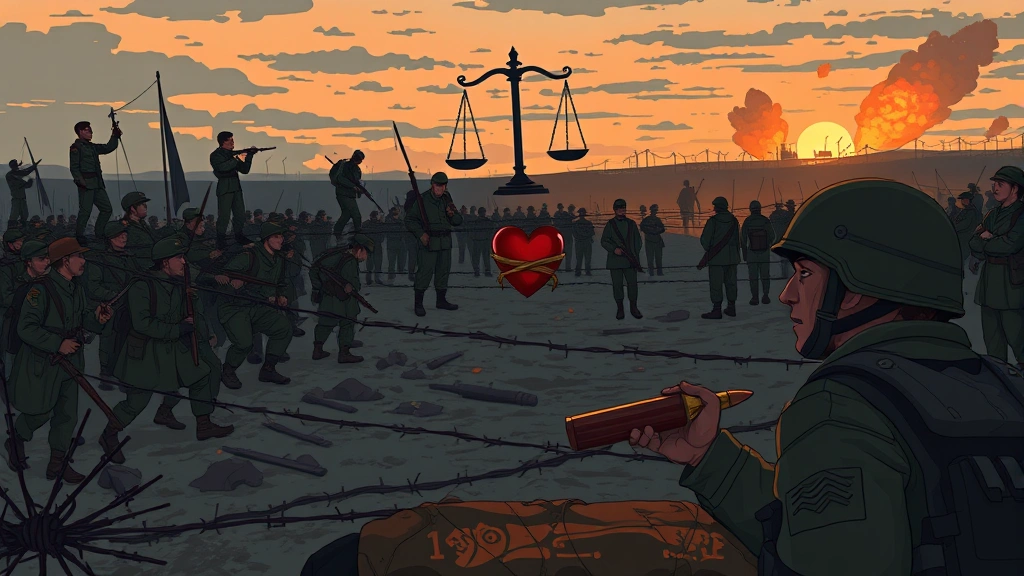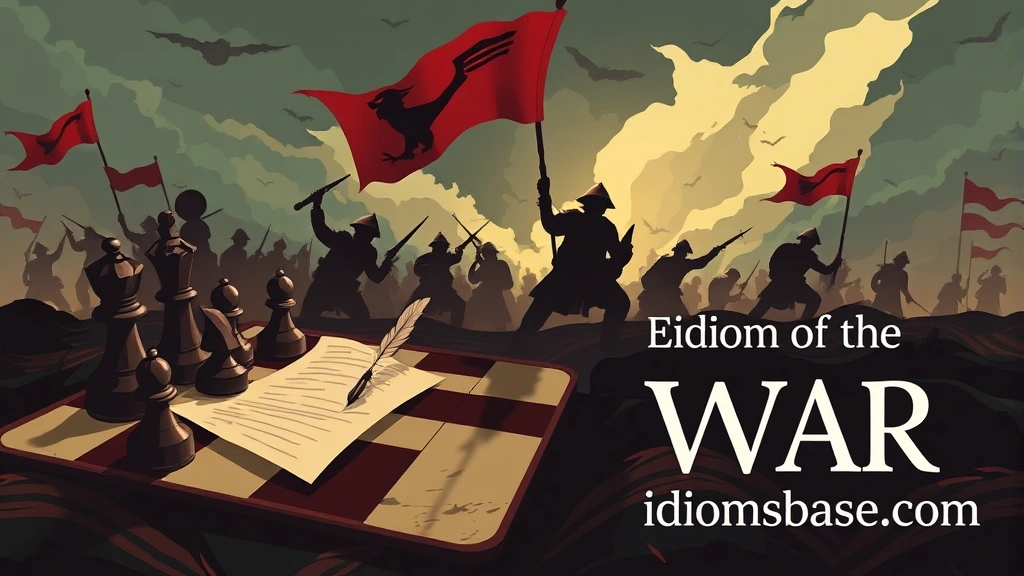Ever wondered how language captures the intensity, strategy, and sheer human drama of conflict? It's fascinating, isn't it, how we use everyday words to paint vivid pictures of war, even when we're talking about office politics or a tough sports match! Idioms are like secret codes, giving us a peek into the historical and cultural experiences that shaped our understanding of conflict.
In this exciting journey, we're going to explore 35 incredible idioms for war. You'll discover how these powerful phrases are used, what they truly mean, and how you can sprinkle them into your own conversations to sound super insightful. Get ready to boost your vocabulary and impress everyone with your linguistic prowess!
What Are Idioms, Anyway?
Before we dive in, let's quickly chat about idioms. An idiom is a phrase or expression where the meaning isn't obvious from the individual words. "It's raining cats and dogs," for instance, doesn't mean animals are falling from the sky (thank goodness!). It means it's raining very heavily. Similarly, war idioms often use metaphors to describe situations of conflict, struggle, or intense competition.
35 Powerful Idioms for War
Let's jump right into our list! Each of these idioms brings a unique flavor to the idea of "war" – sometimes literally, sometimes figuratively.
- All's fair in love and war: This classic means that in certain intensely competitive situations, any tactic, no matter how unconventional, is acceptable. Think about a heated negotiation or a fierce political campaign.
- Bite the bullet: To bravely endure a difficult or unpleasant situation. Imagine a soldier gritting their teeth through pain; now apply that to, say, having a tough conversation you've been dreading.
- Bury the hatchet: To end a quarrel or conflict and make peace. This one comes from Native American traditions where burying a hatchet (a weapon) symbolized the end of hostilities.
- Call to arms: A command or signal to prepare for battle or action. It can be literal, like a general rallying troops, or figurative, like a leader asking people to support a cause.
- Clean up your act: To improve your behavior or performance. While not directly about war, it suggests bringing order and discipline, much like a military preparing for inspection.
- Come out with guns blazing: To start something very aggressively or with great enthusiasm. Picture someone entering a debate ready to dominate!
- Cry havoc and let slip the dogs of war: From Shakespeare's Julius Caesar, this means to unleash destruction and chaos. It's a dramatic way to say things are about to get really bad.
- Declare war on something: To formally begin a strong, organized effort to combat a problem. We "declare war on poverty" or "declare war on illiteracy."
- Dig in your heels: To refuse to change your mind or position, often in a stubborn way. Like a soldier entrenched and unwilling to move.
- Draw a line in the sand: To establish a limit beyond which one will not go, or a point at which one will stop negotiating or backing down. Cross it, and there's trouble!
- Drop a bombshell: To reveal shocking or surprising news. This idiom vividly brings to mind the destructive power of a bomb.
- Fight a losing battle: To make a futile effort to achieve something, knowing success is unlikely. It's a struggle you're probably not going to win.
- Fight fire with fire: To respond to an attack or aggression with a similar form of attack. If someone is aggressive with you, you're aggressive back.
- Fire a warning shot: To do something that serves as a warning to someone, indicating that further action will be taken if they don't change their behavior.
- Flashpoint: A place, event, or situation at which trouble or violence is likely to erupt. Think of a tiny spark that could ignite a huge fire.
- Friendly fire: When one's own side accidentally attacks its own forces. Figuratively, it means unintended harm caused by allies.
- Full-scale war: A war involving the complete resources of the opposing sides, without limitation. Figuratively, it's an all-out effort.
- Gain ground: To make progress or advance in a competitive situation. Like an army moving forward on the battlefield.
- Go on the offensive: To start attacking or acting aggressively after being passive or defensive.
- Hunker down: To prepare for a difficult situation, often by taking shelter or staying put. Like soldiers bracing for an attack.
- In the trenches: Involved in the most difficult or challenging part of an activity, working hard on the practical details. It evokes the harsh reality of front-line warfare.
- Join the ranks: To become part of a group or organization. It's like enlisting in an army.
- Lay down arms: To surrender or stop fighting.
- Live to fight another day: To survive a difficult situation, allowing one to continue the struggle later. A strategic retreat, perhaps!
- Loose cannon: A person or thing that is unpredictable and potentially dangerous. Someone who might "fire" without warning!
- No quarter given: To show no mercy or leniency to an opponent. In historical warfare, "quarter" meant sparing a defeated enemy's life.
- On the warpath: Angry and ready for a confrontation or argument.
- Open fire: To begin shooting or attacking.
- Rally the troops: To gather and motivate people for a common cause or effort.
- Run a gauntlet: To experience a series of troubles or difficulties, often involving criticism or attacks from many sides.
- Shot across the bow: A warning signal or action, intended to show that one is serious and prepared to take further action. Like a warning shot from a ship's cannon.
- Take no prisoners: To be ruthless and aggressive in achieving one's goals, without showing any mercy.
- The fog of war: The uncertainty and confusion that happens in battle. Figuratively, it's any confusing or unclear situation during a conflict of ideas.
- War of words: A heated argument or debate, often in public, where opposing sides attack each other verbally. No physical fighting, just lots of strong opinions!
- Wipe out: To completely destroy or eliminate something.
Key Takeaways

Wow, that was quite a linguistic journey, wasn't it? Here are the big takeaways from our exploration of war idioms:
- Language Reflects Experience: Many of our common expressions are deeply rooted in historical conflicts and military life.
- Figurative Power: Idioms use strong imagery to help us understand abstract concepts like struggle, competition, and victory.
- Versatility is Key: These idioms aren't just for talking about literal wars; they're fantastic for describing everyday challenges, debates, and competitive situations.
- Boost Your Communication: Knowing these phrases makes your language richer, more nuanced, and definitely more engaging.
Frequently Asked Questions (FAQs)
Q1: Why are there so many idioms related to war?
A: That's a great question! Throughout human history, war and conflict have been significant parts of our collective experience. From ancient battles to modern skirmishes, these events have shaped societies, technologies, and, of course, our language. Many common phrases and expressions originate from military life, strategy, or the direct experience of combat because these situations often involve intense emotions, clear objectives, and dramatic outcomes that lend themselves well to vivid metaphors.
Q2: Can I use these idioms in everyday conversation?
A: Absolutely! Many of the idioms we discussed, like "bury the hatchet" or "bite the bullet," are very common in everyday English conversation. They're used to describe non-military situations like business negotiations, personal disagreements, or even just tough choices. Using them correctly can make your speech more colorful and expressive. However, always consider your audience and the context to ensure your meaning is clear and appropriate.
Q3: Are these idioms offensive to people who have experienced war?

A: This is a very important point to consider. While many war-related idioms are widely accepted in general conversation and are often used figuratively, it's crucial to be mindful. If you are speaking with someone who has direct experience with war or conflict, using these idioms lightly might be insensitive. Always prioritize empathy and respect. In formal writing or discussions about actual conflict, it's often better to use more direct and less figurative language to avoid trivializing severe experiences.
Q4: How can I remember all these idioms?
A: Great question! Remembering idioms can be tricky because their meaning isn't literal. Here are a few tips:
- Context is King: Try to remember the idiom in a sentence or a small story.
- Visualize: Create a mental image for each idiom. For "bury the hatchet," imagine two people literally burying a weapon and shaking hands.
- Use Them! The more you use them in your own speaking and writing, the more naturally they'll stick. Practice makes perfect!
- Group Them: Try grouping idioms by theme (e.g., idioms about starting conflict, ending conflict, enduring hardship).
Q5: Are there different "types" of war idioms?
A: Yes, you could categorize them in several ways! For example:
- Idioms about Strategy/Tactics: "Draw a line in the sand," "Go on the offensive."
- Idioms about Enduring Hardship: "Bite the bullet," "In the trenches."
- Idioms about Conflict Resolution: "Bury the hatchet," "Lay down arms."
- Idioms about Warning/Threat: "Fire a warning shot," "Shot across the bow."
- Idioms about Aggression/Intensity: "Come out with guns blazing," "Take no prisoners."
This categorization can help you understand the nuances and choose the perfect idiom for the situation!
We hope you've enjoyed this deep dive into the fascinating world of war idioms. Keep an ear out for them in movies, books, and conversations, and don't be shy about using them yourself! Language is a powerful tool, and mastering idioms is like unlocking a new level of communication. What's your favorite war idiom, and how do you plan to use it? Let us know!







